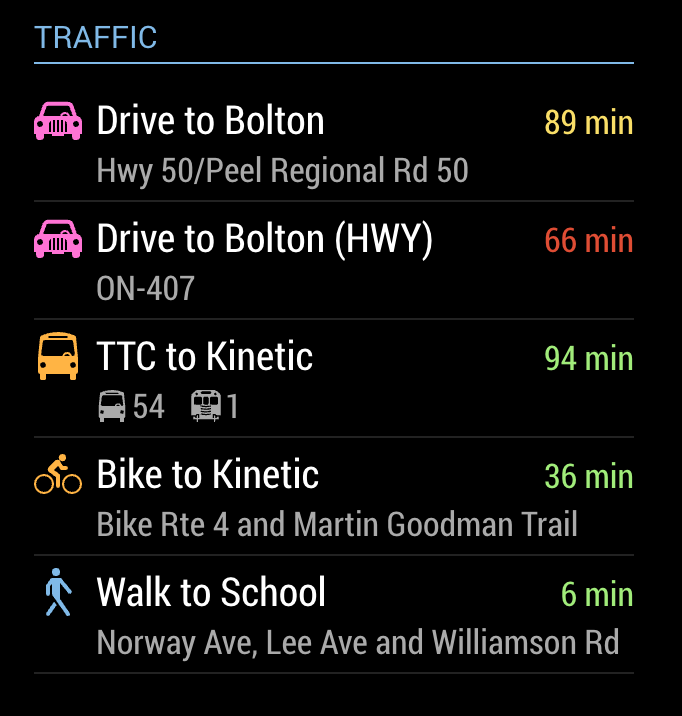Read the statement by Michael Teeuw here.
MMM-MyCommute
-
@olexs this is a great addition! Give me a chance to review it to make sure there’s not going to be any adverse affects on the core purpose of this module, or if it will generate too many requests to the API. Using a free API token, we’re limited to 2500 requests per day. While this may seem like a lot, each destination requires its own request. It’s surprisingly easy to blow that limit – I did it once during development of this module!!
-
@j.e.f.f I am aware of the API problem, which is why I set the config option to “off” by default. On my own mirror, I have 2 default destinations + max 3 calendar entries shown. With 5 destinations refreshing every 10 minutes, this amounts to a total of 720 requests per 24 hours, well below the limit. Of course users can set the calendar entries number higher, or configure more “static” destinations. Maybe one could implement an explicit console warning when too many destinations (10 or more) are configured, and one comes close to the limit?
-
@j.e.f.f Thanks for the quick reply!
I am looking for a solution that works in Germany as well. Therefore adapting your TTC module is a great idea, but unfortunately not supported here.As it seems more complex than I thought, maybe boiling it down to a “leave by” would be great. If I could add a planned arrival time and google reports xx minutes, an output using the necessary departure time would be great. This could be based on a simple calculation and color coded depending on the percentage of a longer trip than usual.
Is the update-frequency of the google-prediction known? What is the current update-frequency you are using? Pulling the numbers more often than google woulds change them would not be necessary. I am having five queries running and an update every five minutes would be enough for me (~1500/queries day).
-
@rudibarani there is a cap of 2500 requests per day when using the free API. Therefore I’ve kept the poll frequency at a very conservative 10 minutes. Each destination requires its own request so it’s fairly easy to blow the limit if you’re not careful.
I could put a calculation in place where if you say you need to be at a certain place by 9:00, then I could put a “leave by” message. But as the data poll is not very frequent, you could see something that says “leave by 8:00,” but it’s already 8:05.
I can also make the polling frequency configurable so that you could mitigate this, and include an explicit warning in the reader of what the potential consequence is.
-
@j.e.f.f: I found that MMM-Traffic offers a leave by option and there is also a variant MMM-TrafficCal which integrates with a calendar to get the time based on the next and current location from a calendar. Maybe we can learn from them?
Regarding the cap:
- would it be feasible to have a hardcoded stop for new polls after 2500 request on a day (and notify the user, if to many polls are / will be made)?
- would it be possible to limit the time when polls are made? Leaving out 22h - 5h could already save a lot of capacity.
Regarding “leave by”:
To me, having an option to either take the arrival time from a variable (or even a calendar) would be great. There could be the case that the departure time has already passed, but that would be OK for me.Thanks!
-
@rudibarani I’ve already included logic to keep the requests to a minimum based on the time windows you set. The entire module is governed by the
startTimeandendTimeparameters. Outside of that window, not only is the module not visible, but it stops polling Google. Likewise, if you set a time window for a particular destination, Google will only be polled for that particular destination within that window.I’m still considering how I might manage the Calendar integration… I’d want it to be smart about when it starts polling for travel times. For example, if my appointment is for sometime in the evening, I don’t really care what the drive will be like to get there in the morning, so I’d be wasting a request. So maybe there is a threshold, say, two hours before the appointment time, where it gets the initial estimate, and then based on that doesn’t poll again until, say 30 minutes before you need to leave.
-
@j.e.f.f Thanks for the clarification, that there are no polls while it is not visible.
One easy way would be to add a “smart timer” if you polled with increasing frequency depending on the start time. Also possible would be polling once after midnight to get an idea about the expected travel time without delays. This duration plus a buffer (e.g. three times the travel time; user customizable) could determine the dynamic start time when travel times will show up.Different question: would it be possible to colours only in case of delays (=not show a “good” time in green but white)?
-
@rudibarani sure. You can add a rule in your custom css file like this:
.MMM-MyCommute .travel-time.status-good { color: #FFFFFF; } -
@j.e.f.f Great! I keep learning about the way MM-modules work. Thanks a lot
-
Hi @j.e.f.f,
is there a way to localize the output of MMM-MyCommute? I noticed that MMM-MyWeather uses a translate folder that contains a file for each supported language. Maybe something similar would be possible here, too. I am happy to provide German translations if you like.
Related to that would be adhering to the timeformat set in a users config.js. Currently, the module seems to only support the 12 hour am/pm-format. Having a 24h format as in my other modules would be great.
Thanks for caring to think about this!

